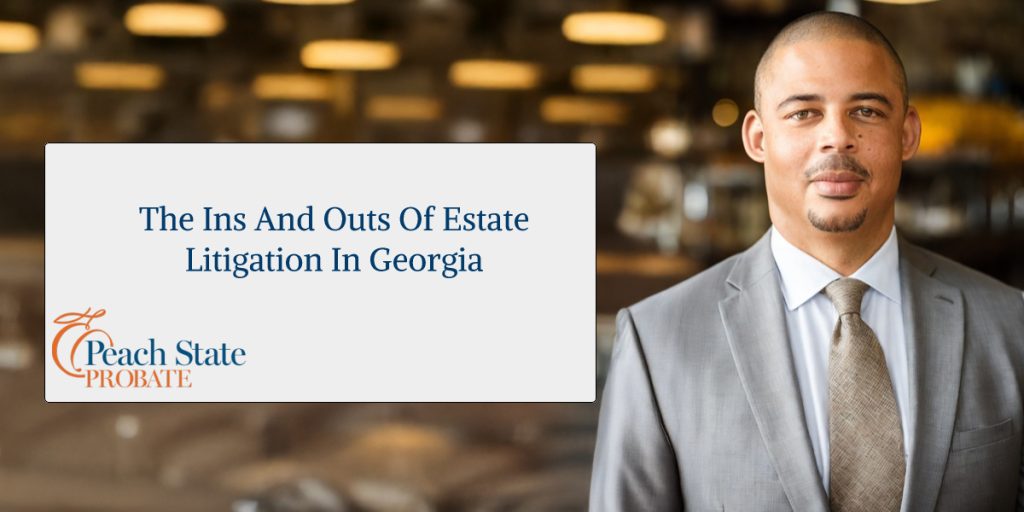## Understanding Estate Litigation in Georgia
Estate litigation encompasses a range of legal disputes related to the administration of estates, wills, and trusts after a person passes away. In Georgia, estate litigation can arise from disagreements over the validity of a will, disputes among beneficiaries, or challenges to a fiduciary’s actions. With the complexities of estate law, it is crucial to recognize the skills necessary for navigating the litigation process effectively.
In the event of a disagreement regarding an estate, it is essential to understand the potential legal ramifications. Certain aspects, such as creditor claims, will contests, and inheritance disputes, can require litigation to resolve. The emotional strain of dealing with the loss of a loved one can be exacerbated by disputes regarding estate matters, making this an area of law that demands both sensitivity and skill.
The advantages of understanding estate litigation extend beyond just resolving disputes; comprehension of the legal framework surrounding estate disputes can inform decisions, helping individuals better navigate their options. This foundational knowledge is vital for anyone involved in estate management, whether as a beneficiary, executor, or personal representative.
## Definition and Scope of Estate Litigation
Estate litigation refers to the process of resolving disputes that arise within the context of probate and trust administration. This type of litigation can involve various issues, including the validity of a will, mismanagement of estate funds, and disputes over the interpretation of estate documents. Additionally, it can include challenges to the appointment of a personal representative or trustee.
A key aspect of estate litigation is the will contest, which occurs when an interested party argues that a will should not be admitted to probate. Grounds for contesting a will may include claims of mental incapacity at the time of signing, undue influence from another party, or failure to meet legal formalities in the will’s creation. Estate litigation also often touches on other aspects of trust law and can address disputes concerning asset distribution.
In Georgia, the probate process involves specific statutory requirements, and litigation can often become contentious due to emotional ties and familial relationships. Recognizing what constitutes estate litigation helps individuals prepare for potential disputes and understand the necessary legal channels for resolution.
## Importance of Estate Litigation
The significance of estate litigation cannot be overstated, as it often serves to protect the rights of beneficiaries and ensure that estates are managed according to the decedent’s wishes. Legal disputes can be a natural part of the estate administration process, especially in instances where there are multiple heirs with differing expectations. Addressing these disputes through litigation can help to clarify intentions and reduce the likelihood of future conflicts.
Additionally, the outcome of estate litigation can have lasting implications for all parties involved, often directly affecting the financial and emotional well-being of beneficiaries. By resolving issues within the legal framework, stakeholders in an estate can achieve closure, allowing them to navigate their grief without the burden of ongoing disputes.
An informed understanding of estate litigation also promotes overall transparency in the administration of estates. When disputes arise, the litigation process provides the opportunity to review actions by executors or trustees, ensuring they fulfill their fiduciary duties. Ultimately, this process can contribute to a fair distribution of assets and facilitate the peace of mind necessary for all parties involved.
## Legal Framework Surrounding Estate Litigation in Georgia
Georgia’s estate litigation operates within a legal framework that encompasses varying statutes and doctrines. At its core, the probate code governs how estates are administered, providing a structured approach to managing wills, trusts, and estate affairs. The probate courts in Georgia handle estate litigation cases, which can include will contests, claims against estates, and accusations of misconduct by fiduciaries.
The legal process typically begins when a petition is filed in the probate court. This could be a petition to contest a will, seek the removal of a personal representative, or settle other disputed matters regarding the decedent’s estate. Understanding the procedural requirements, such as filing deadlines and the need for specific documentation, is crucial and can heavily influence the course of litigation.
The outcome of estate litigation can often hinge on local laws and procedural rules. Moreover, the Georgia probate courts have formulated important case law that further defines the scope and implications of estate disputes. For individuals facing the prospect of litigation, understanding this legal context is essential for effective navigation through the often complex landscape of estate litigation.
## Real-World Scenarios Involving Estate Litigation
Understanding estate litigation through real-world examples helps to illustrate its complexities and challenges. For instance, imagine a family where a parent has passed away, leaving a will that stipulates unequal distribution of assets among siblings. Feelings of anger and betrayal may arise when one sibling feels they have been unfairly treated. In such a case, the aggrieved party may initiate a will contest, arguing that the will does not reflect the decedent’s true intentions.
Another example might involve a scenario where a family member believes that a fiduciary is mismanaging estate assets or is not properly fulfilling their duties. In this case, beneficiaries may file a petition for the fiduciary’s removal, challenging their decisions or actions taken under the belief that they violate fiduciary obligations. Such disputes not only need to be backed by substantial evidence, but they can also lead to prolonged court battles that drain financial resources and heighten family tensions.
Lastly, the interpretation of ambiguous language in a will or trust can lead to estate litigation. For instance, if a will states that “all personal belongings” should be distributed to one beneficiary without clarifying what constitutes “personal belongings,” disputes can easily arise among family members. These conflicts can invoke estate litigation to seek the court’s guidance in interpreting the decedent’s intentions.
## Steps Involved in Estate Litigation
Navigating estate litigation can be intricate, making it essential for those involved to understand the steps typically required when engaging in legal action. The process begins with gathering relevant documents, such as the decedent’s will, trust agreements, and any other pertinent estate materials. Collecting this information lays the foundation necessary for making informed arguments and claims in court.
The next step often involves filing a petition with the probate court, outlining the nature of the dispute and the relief sought. This document must be meticulously prepared, as any deficiencies or errors could lead to delays or dismissal of the case. After filing, the court will schedule a hearing, during which parties involved will present their arguments, and any witnesses can be called to testify.
After the hearing, the probate court will issue a ruling based on the evidence and arguments presented. Depending on the complexity of the case, this stage may include mediation or alternative dispute resolution methods to attempt to find a resolution outside the courtroom. If a settlement cannot be achieved, the court will issue a final decision, marking the end of litigation.
## Mistakes to Be Aware of in Estate Litigation
Engaging in estate litigation is an intricate process, and there are several common mistakes individuals should strive to avoid. One prevalent error is failing to seek timely legal advice. Many individuals may attempt to navigate the complexities of litigation without the guidance of an attorney, which can lead to significant oversights or procedural missteps. Early legal counsel can not only streamline the process but also ensure that all necessary documents are appropriately prepared and submitted.
Another common mistake is neglecting to gather and preserve evidence. In disputes involving testimonies or documentation, establishing a strong case relies on having concrete evidence to support claims made. Failing to collect relevant materials—such as financial records, communications, or even witness statements—can weaken the argument during litigation and negatively influence the outcome.
Additionally, emotions can often cloud judgment during estate litigation, leading parties to make rash decisions. Disputes often stem from familial tensions, and while it may be instinctual to fight for one’s perceived rights, the emotional weight of the situation can result in actions that exacerbate conflicts rather than resolving them. Maintaining a level-headed approach, with the guidance of a competent attorney, can significantly enhance the ability to navigate these disputes successfully.
## When to Seek Legal Counsel
Engaging in estate litigation often necessitates the assistance of a knowledgeable attorney, especially when navigating complex legal disputes. Individuals should consider seeking professional legal representation when significant assets or substantial sums of money are involved, as the stakes can escalate quickly. Legal counsel can provide invaluable insights and guidance on how to best present a case as well as help manage expectations with regards to potential outcomes.
Equally important is recognizing when conflicts arise within the family regarding estate matters. When personal relationships are strained or communication breaks down, an attorney can serve as an intermediary to facilitate discussions and reduce tensions. Outside perspectives often promote more productive conversations, allowing families to work towards amicable resolutions instead of getting bogged down in contentious litigation.
Another critical time to consult an attorney is when the estate administration process raises potential red flags, such as perceived mismanagement or breaches of fiduciary duty. In such situations, legal counsel can safeguard against possible injustices by ensuring proper oversight and making informed decisions moving forward. Being proactive in these scenarios can significantly mitigate complications before they escalate into lengthy litigation.
## Advantages of Representation in Estate Litigation
Having appropriate legal representation during estate litigation offers numerous advantages for parties involved in the process. A primary benefit is the experience attorneys bring to the table; they grasp the intricate legal nuances that can significantly affect the outcome of a case. With their knowledge of local laws, court procedures, and relevant precedents, attorneys can effectively strategize and present claims, increasing the likelihood of a favorable resolution.
Another key advantage of professional representation is the ability to keep emotions in check. Given the complexity of estate matters, personal feelings can often cloud judgment. Having an attorney serve as an objective advocate allows individuals to focus on legal issues rather than emotional turmoil. This professional detachment ensures that timelines are adhered to, and decisions are made in accordance with an established legal framework.
Lastly, legal representation can often expedite the resolution process. Attorneys are well-versed in the courts, which can facilitate clearer communication with judges and clerks while ensuring adherence to the rules of procedure. This efficiency can potentially save time and reduce legal costs associated with prolonged disputes. Therefore, engaging an attorney who specializes in estate litigation is both a pragmatic and advantageous choice for individuals involved in these matters.
## How Peach State Probate Supports Clients Through Litigation
Peach State Probate is dedicated to guiding clients through the often-stressful landscape of estate litigation in Georgia. With extensive experience in probate matters, the firm is uniquely positioned to assist clients in understanding the complexities of their cases. This firm recognizes that estate disputes can not only involve finances but also deeply affect family relationships and emotional well-being.
The attorneys at Peach State Probate provide tailored services, working closely with clients to identify their goals and challenges in litigation. They help demystify the legal processes involved, ensuring that clients are informed and empowered throughout each stage of their case. By fostering open communication, the firm allows clients to make informed decisions, promoting more effective outcomes.
Additionally, Peach State Probate is committed to fighting vigorously for clients’ rights and interests. Whether dealing with a will contest, challenging a fiduciary, or navigating distribution disputes, clients can rely on the firm to advocate passionately on their behalf. Their dedication to client satisfaction and results positions Peach State Probate as an optimal choice for those facing estate litigation challenges in Georgia.




